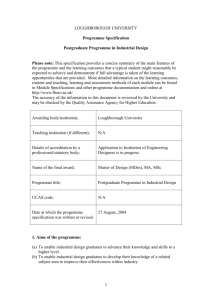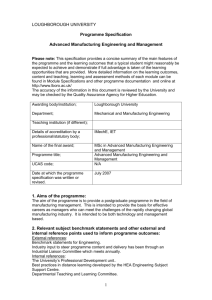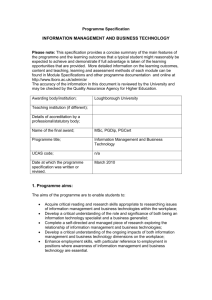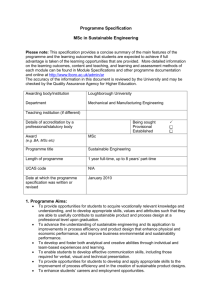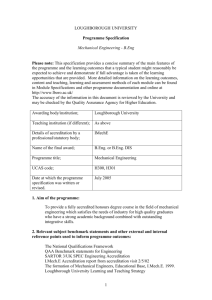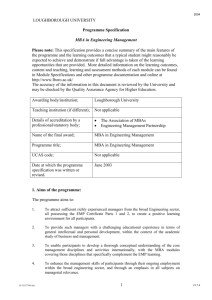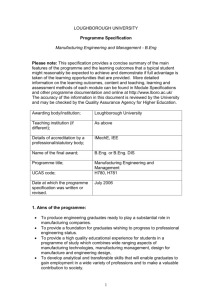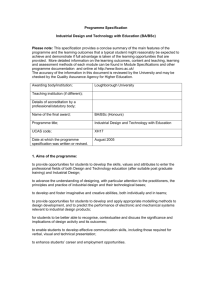MSc - Loughborough University
advertisement
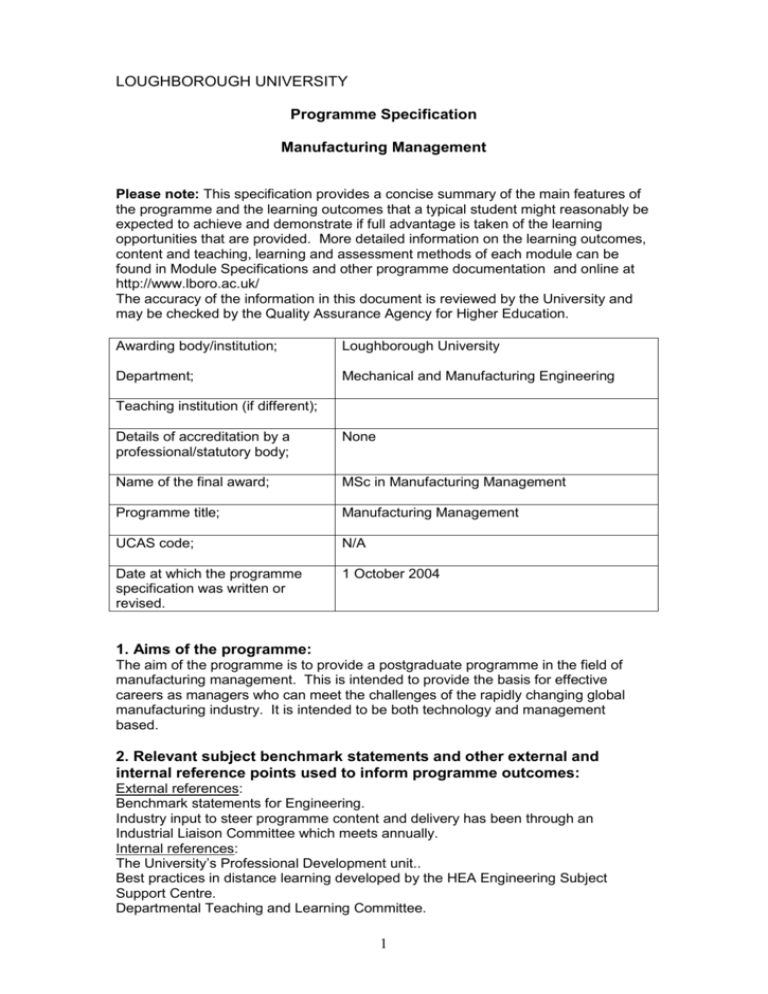
LOUGHBOROUGH UNIVERSITY Programme Specification Manufacturing Management Please note: This specification provides a concise summary of the main features of the programme and the learning outcomes that a typical student might reasonably be expected to achieve and demonstrate if full advantage is taken of the learning opportunities that are provided. More detailed information on the learning outcomes, content and teaching, learning and assessment methods of each module can be found in Module Specifications and other programme documentation and online at http://www.lboro.ac.uk/ The accuracy of the information in this document is reviewed by the University and may be checked by the Quality Assurance Agency for Higher Education. Awarding body/institution; Loughborough University Department; Mechanical and Manufacturing Engineering Teaching institution (if different); Details of accreditation by a professional/statutory body; None Name of the final award; MSc in Manufacturing Management Programme title; Manufacturing Management UCAS code; N/A Date at which the programme specification was written or revised. 1 October 2004 1. Aims of the programme: The aim of the programme is to provide a postgraduate programme in the field of manufacturing management. This is intended to provide the basis for effective careers as managers who can meet the challenges of the rapidly changing global manufacturing industry. It is intended to be both technology and management based. 2. Relevant subject benchmark statements and other external and internal reference points used to inform programme outcomes: External references: Benchmark statements for Engineering. Industry input to steer programme content and delivery has been through an Industrial Liaison Committee which meets annually. Internal references: The University’s Professional Development unit.. Best practices in distance learning developed by the HEA Engineering Subject Support Centre. Departmental Teaching and Learning Committee. 1 3. Intended Learning Outcomes Knowledge and Understanding: On successful completion of this programme, students should be able to demonstrate knowledge and understanding of: The generic nature of design and the phases and activities within the overall design process. The role of human mental processes in design. The relationships between design manufacturing and commerce and the principles of new product development. Management and business practices (including finance, design management and quality). Basic company accounting. Sustainable development, environmental legislation, resource conservation and design for the environment in a company context. Design and programming of CNC machine tools. Manufacturing system layouts. Manufacturing control systems. The modern global enterprise and its organisation. The effect of national culture upon business performance. Trading in the global market. IT infrastructure for global operation and the virtual enterprise. The principles of Rapid Prototyping, Rapid Tooling, and Rapid Manufacture; their applications and limitations. The role and limitations of integrated software support systems for product design. The capabilities of Product Data Technology. Lean and agile operations’ philosophies. Six sigma systems. Modern distribution systems. Demand management. Specify the requirements of a manufacturing enterprise and business process. Team management techniques and practices. Skills and other attributes: a. Subject-specific cognitive skills: On successful completion of this programme, students should be able to: Appreciate the broad range of influences and activities within the design process and explain their significance. Evaluate technical and commercial risk and make decisions based on available information. Identify solutions to engineering problems from a sustainability/environmental standpoint. Evaluate machine tool designs. Design manufacturing cells/systems for new/existing products. Specify and implement a manufacturing system. Create an appropriate organisation for global business. Model the global network. Understand IT structures in the global network. Select on the basis of application and limitations, the most appropriate “rapid” technology. Understand the capabilities and limitations of modern computer aided design technology as applied to concurrent engineering. 2 Evaluate the most appropriate software to support concurrent engineering activity. Specify and design an appropriate lean/agile business or distribution system. Evaluate mass-customisation systems. Develop a complex manufacturing enterprise, evaluating and justifying the chosen route. b. Subject-specific practical skills: On successful completion of the programme, students should be able to: Use the design process to plan and carry out projects. Plan and implement reorganisation of a company for increased effectiveness. Select and conduct experimental procedures to support analysis. Generate new ideas and develop and evaluate a range of solutions. Programme an NC machine tool. Perform and analyse results for both static and dynamic accuracy of a machine tool. Use a CAD/CAM system to facilitate NC programming. Design a global organisation. Simulate and model IT systems for global economy. Select and train people for overseas assignments. Use some of the various rapid prototyping systems and processes. Use appropriate CAE techniques to generate tooling. Use modern information modelling techniques for decision support systems. Design in detail a lean and/or agile business system. Understand the integration of lean/agile systems. Use enterprise modelling architectures, methods and simulation tools. Understand project management skills and team working practices. c. Key/transferable skills: On successful completion of this programme, students should be able to: Plan and monitor multi-disciplinary projects. Appreciate the central role of design within engineering. Communicate effectively and make presentations of a technical/business nature to achieve maximum impact. Identify methods to assist in innovation, teamworking and engineering communication. Demonstrate competence in using computer based engineering techniques. Analyse and understand complex engineering problems. Use teamworking skills. Teaching, learning and assessment strategies to enable outcomes to be achieved and demonstrated: All modules are delivered as block taught one-week modules to provide access to both full-time and part-time students. Each module is taught by a mixture of lectures, seminars and practical work. Assessment is in the form of examinations and/or written coursework and/or oral presentation of in-class assignments as described in the module specifications. A full-time programme administrator provides support to the programme. A module timetable provides structure to the programme. A coursework hand-in timetable system is provided to control student working across the year. Research skills are developed through coursework assignments and in particular through an industrial project that includes an exhibition of work, oral presentation, a research paper, in addition to the conventional thesis. 3 4. Programme structures and requirements , levels, modules, credits and awards: The programme is the responsibility of the Wolfson School of Mechanical and Manufacturing Engineering. It is studied on a full-time or part-time basis and leads to one of the following awards: MSc – 180 credits Postgraduate Diploma (PGDip) – 120 credits Postgraduate Certificate (PGCert) – 60 credits The programme is made up of taught modules and a substantial project. All modules have a credit weight. The credit weight for a module is awarded to a candidate who gains a module mark of not less than 50%. The lowest acceptable mark for a module is 40% (the minimum performance level). Full-time candidates may be awarded an MSc after accumulating 90 credits for their project, 60 credits from taught modules and being assessed at the minimum performance level or better in further modules with a total credit weight of 30. The modules are as follows: Code MMP202 MMP203 MMP207 MMP300 MMP407 MMP408 MMP500 MMP501 MMP503 MMP600 MMP607 Subject Global Business Strategy & Systems Lean and Agile Manufacture Eng. Design Management & Business Studies Product Data Technology Eng. Design for Sustainable Development Eng. Design Process & Project Management Major Project (part-time) Major Project (full-time) Integration Project Advanced Manufacturing Technology Rapid Prototyping, Tooling and Manufacturing Module Weight 10 10 10 10 10 10 90 70 20 20 10 5. Criteria for admission to the programme: Admission is normally by an honours degree in engineering or physical sciences. Other academic or professional qualifications such as a chartered professional qualification are considered on their merits. Industrial or other appropriate experience may also be used as part qualification for admission to the programme. 6. Information about assessment regulations: Students are assessed on each module using coursework and/or examination. Assessment of a module normally takes place at the end of the semester the module is taught in. The individual design project is assessed at the end of the programme. Reassessment may take place during the University’s special assessment period. The pass mark to achieve credit for a module is 50%. There is also a minimum performance pass-level, which is set at not less than 40% in the module assessment. In order to pass the MSc students must: take modules with a total credit weight of 180, including the project module; obtain 150 credits; pass modules with a further credit weight of 30 at the minimum 40% performance pass-level. In terms of marks in the module assessments, this means that students must obtain: 50% or more in their project module (yielding 70 credits full-time/90 credits parttime); 50% or more in modules with a credit weight of 60 part-time/80 full-time; 40% or more in further modules with a credit weight of 30. In order to obtain distinction in the MSc, students must obtain 180 credits and have a weighted average assessment score over all offered modules of at least 70%. 4 7. Indicators of quality: An independent assessment of all university departments by the Higher Education Funding Council for England (HEFCE) awarded 23 out of a possible 24 for teaching in the Wolfson School. In the 2001 RAE exercise, the Wolfson School of Mechanical & Manufacturing Engineering was rated grade 5, covering the whole range of the School’s activities. Interdisciplinary and collaborative work is one of the School’s key strengths and takes place at all levels within the University as well as with external national and international organisations. 8. Particular support for learning: Careers Service: http://www.lboro.ac.uk/service/careers/section/careers_service/welcome.html The Careers Service provides support and advice for students seeking careers guidance and help with job-searching techniques, together with a library of careers resources, careers fairs, employer presentations, management and skills courses and a comprehensive website containing vacancies and information. In the UK Graduate Careers survey, sponsored by the Times Newspaper, Loughborough University Careers Service was rated as one of the most impressive with over 80% of students rating it as good or excellent. The service has also been identified by employers as the amongst the top ten Higher Education careers services in the 2003 Association of graduate Recruiters/Barkers survey. Library: http://www.lboro.ac.uk/library/ The University Library provides advanced support for student learning in a purposebuilt building and electronically via the web. It is open for upwards of 80 hours per week during semester and holds a stock of more than half a million volumes and an extensive serials collection. Numerous PC workstations (100+), networked printing facilities and self-service photocopiers are also available. The Library is designated EDC (European Documentation Centre). The Library catalogue is available on-line, as are electronic versions of reading lists. Over 180 subject-specific electronic databases can be accessed by users both on campus and elsewhere. The Library organises induction sessions for first year students and librarians can provide flexible training for students and researchers throughout their time at Loughborough. User support is also available from the Library information desks, via printed and online guides and through a series of ‘Lunchtime in the Library’ and other training sessions. There are a variety of study environments in the Library, including individual and group study desks, private carrels and group study rooms. Computing Services: http://www.lboro.ac.uk/computing/index.html Computing Services provides the University IT facilities and infrastructure. General purpose computer resources across campus are open 24 hours and more specialist computer laboratories are provided I partnership with departments. Students in halls of residence are supported in connecting their computers to the high speed network. The University’s virtual learning environment “LEARN” provides on and off campus access to web-based teaching materials provided by lecturing staff. Professional Development: http://www.lboro.ac.uk/service/pd Professional Development (PD) provides continuing professional development and support in teaching and a wide range of other areas. 5 New lecturers attend a personalised programme of PD courses and, in the final year of probation, PD assesses their teaching through direct observation and a portfolio. Accreditation for this process has been awarded by the Higher Education Academy (HEA). PD works directly with staff who wish to develop more effective teaching and learning methods – including the area of learning technologies – and provides resources to support the learning skills development of students. Other development opportunities are provided in institutional strategic priority areas and in response to discussions with departments in the context of their needs. Counselling Service and English Language Study Unit: http://www.lboro.ac.uk/service/counselling/ http://www.lboro.ac.uk/admin/elsu/index.htm The Counselling Service and English Language Study Unit are able to support individual students in resolving problems and in improving communication skills for international students. Engineering Education Centre: http://engstudent.lboro.ac.uk The Engineering Education Centre supports the implementation of innovative Teaching and Learning Methods into the curriculum, within the Faculty of Engineering, via the use of appropriate technologies. The Centre provides a focus for computer based learning and teaching activities in the Engineering Faculty, unlimited advice on Computer aided learning/assessment and distance learning materials, a limited amount of free software development time, and help to secure funding and manage projects relevant to learning and teaching. Mathematics Learning Support Centre: http://learn.lboro.ac.uk/sci/ma/mlsc/ The Centre, which is based in the Department of Mathematical Sciences, provides a range of services designed to support any undergraduate student in the University in their learning of mathematics. In particular it aims to help students in the earlier stages of their studies who might benefit from resources and tuition over and above that normally provided as part of their course. The Virtual Engineering Mathematics Learning Support Centre provides online help for Engineering students in mathematics. This site is an additional resource provided by the Mathematics Learning Support Centre in conjunction with the HEA Engineering Subject Centre, providing students with an additional way of accessing some of the resources held within the Centre 24 hours a day. Disabilities & Additional Needs Service: http://www.lboro.ac.uk/disabilities/ The Disabilities and Additional Needs Service (DANS) offers support for students and staff including: advice both on matters relating to the Special Educational Needs and Disabilities Act (SENDA); adaptation of course materials into Braille/large print/tape/disk/other formats; organising mobility training; BSL interpretation; provision of communication support workers; note takers in lectures/tutorials; assessment of specific support, equipment and software needs; individual/small 6 group tuition for students who have dyslexia; representing students’ needs to academic and other University departments; organising adapted accommodation to meet individual needs; helping to organise carers to meet any personal care needs; organising appropriate support for students who have a mental health problem. DANS has links with the RNIB Vocational College, Derby College for Deaf People and the National Autism Society to offer effective support to students at the University. It regularly takes advice from other national and local organisations of and for disabled people. Where a student has complex support or accommodation needs, contact with DANS is strongly advised prior to application. 9. Methods for evaluating and improving the quality and standards of learning: The University has a formal quality procedure and reporting structure laid out in its Academic Quality Procedures handbook, available online at: http://www.lboro.ac.uk/admin/ar/policy/aqp/index.htm and directed by the Pro-Vice-Chancellor (Teaching). Each Faculty has an Associate Dean for Teaching responsible for all learning and teaching matters. For each Faculty there is a Directorate (responsible for the allocation of resources) and a Board (responsible for monitoring quality issues within each department). Support is provided by Professional Development. Student feedback on modules and programmes is sought at regular intervals, individual programmes are reviewed annually, and Departments review their full portfolio of programmes as part of a Periodic Programme Review (every five years). Minor changes to module specifications are approved by the Associate Dean (Teaching) on behalf of the Faculty Board, and ratified by the University Curriculum Sub-Committee in accordance with the University's quality procedures. Major changes are formally considered by the University Curriculum Sub-Committee. All staff participate in the University's staff appraisal scheme, which helps to identify any needs for staff skills development. Both probationary staff and those seeking promotion to Senior Lecturer are subject to a formal teaching evaluation scheme, administered by PD and accredited by the Higher Education Academy. 7
